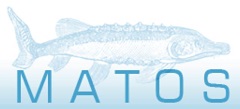What is MATOS?
The ACT Network houses an interoperable database, which is an Ocean Tracking Network (OTN)-compatible node, called the ACT_MATOS node, that facilitates interconnectivity between other OTN-compatible nodes, such as the FACT Network node and the OTN node. Acoustic telemetry researchers use the MATOS data portal to submit data to the ACT database. The ACT database is a secure way to QA/QC and store acoustic telemetry data, and it facilitates detection cross-matching between tag and array owners among all OTN-compatible nodes.
Quality controlled metadata such as animal and transmitter IDs, release dates and times, receiver array deployment locations and time frames, and raw receiver download files (e.g., formats .vrl, .vdat, or .tdb) are used to cross match detections between tag and array owners. To upload metadata to the network, members complete required fields in standardized metadata templates, which are obtainable from the MATOS website, and submit them through the MATOS data portal. After a researcher uploads their metadata and detection files to MATOS, the metadata are quality controlled through various standardization scripts to ensure metadata integrity before they are uploaded to the interoperable ACT database that is used for cross matching detections and data storage.
In MATOS, each project contains a public facing webpage created by the researchers. The visibility of the project is controlled by the researchers, who determine the extent of their data visibility to the public, investigators, or researchers. The individual researcher is in control of the level of information provided on the webpage regarding receiver arrays and is responsible for ensuring that their selection complies with the data policies associated with their project (e.g., by funders or permit issuers).
The MATOS system was developed as a joint effort of MARACOOS , NOAA Chesapeake Bay Office, and the Integrated Ocean Observing System (IOOS) Animal Telemetry Network (ATN). Supporting partners include NERACOOS, NOAA's Northeast Fisheries Science Center, the Atlantic States Marine Fisheries Commission (ASMFC), and the Smithsonian Environmental Research Center (SERC). MATOS is administered by RPS, a Tetra Tech company.

